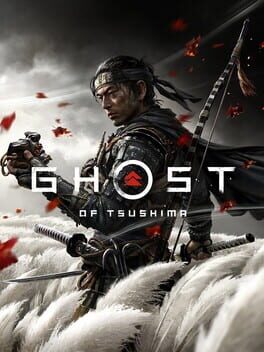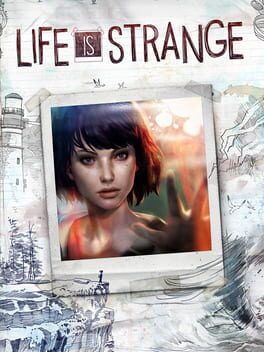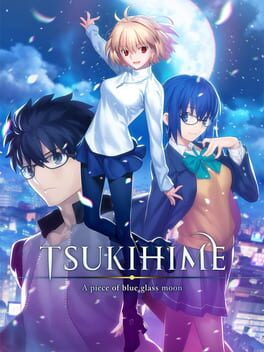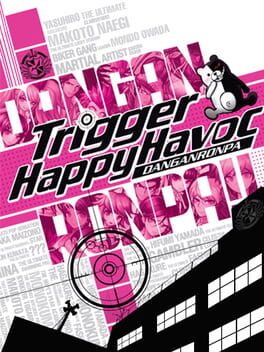bacontrarian
14 reviews liked by bacontrarian
Ghost of Tsushima
2020
appropriate in many ways as the apex of open world game design this generation, hysterical in others. on the one hand it's one of the blandest and most by the numbers maps i've ever seen. on the other hand the crux of the narrative revolves around the main character making the hard choice to do stealth kills instead of "Go Loud." sadly the latter aspect isn't funny enough to carry it
Ghost of Tsushima
2020
Life is Strange
2015
Every Zero Escape Game:
Protag: Ow, my ass hurts-
Character: That reminds me of this story where this scientist hit his ass on the edge of a table, but didn’t feel it. Then, months later, he died of ass pain. They call it Temporal Ass Pain or TAP
Protag: I’d TAP that-
Character: Say we took two asses, and we both slapped them really hard, there’d be a 56.000079% chance that one of them won’t feel it. That pain didn’t just get absorbed by the ass tissue, it’s being transported to the future. They call people who don’t feel Ass pain until later…TAPers…I wonder…if they could transport ass pain to someone else-
Zero: Ive injected Ass Poison into all of your left buttcheeks. You have exactly 2 hours to solve my Ass Slap puzzle.
Protag: Ow, my ass hurts-
Character: That reminds me of this story where this scientist hit his ass on the edge of a table, but didn’t feel it. Then, months later, he died of ass pain. They call it Temporal Ass Pain or TAP
Protag: I’d TAP that-
Character: Say we took two asses, and we both slapped them really hard, there’d be a 56.000079% chance that one of them won’t feel it. That pain didn’t just get absorbed by the ass tissue, it’s being transported to the future. They call people who don’t feel Ass pain until later…TAPers…I wonder…if they could transport ass pain to someone else-
Zero: Ive injected Ass Poison into all of your left buttcheeks. You have exactly 2 hours to solve my Ass Slap puzzle.
Omori
2020
Recommended by XenonNV as part of this list.
Partway through OMORI it dawned on me that there's a timeline where this game managed to release when I was in high school and I would've 100% made it a core facet of my personality for years.
OMORI is more likely than not the game that comes to everyone's mind when they think of the quintessential "Quirky Depression Earthbirth RPG", the hypothetical dead horse that encapsulates a lot of people's gripes with the modern indie scene and all it's eccentricities, and, to concede to that stereotyped image somewhat, it's for the most part true. OMORI is part lighthearted and surreal RPG about the titular main character and his adventures in the wonderfully quirky dream world of Headspace, and part mental health story about Omori's real-life counterpart Sunny and his struggles in the mundane reality of Faraway Town with his own mental health and relationships. The primary issue with OMORI however is not really with it's oft-maligned aesthetic or subject matter, but rather the fact that it's a complete tonal mess.
Headspace, as a dream world inside of Sunny's head, is obviously allowed to be a little surreal, as it's where most of the game's Earthbound DNA is apparent, from it's cutesy enemies to it's fun cast of eccentric NPCs and elevated sense of reality where anything goes. It's where 90% of OMORI takes place and is, for the most part, incredibly charming and fun. The tonal issues start to become apparent though when the Headspace sections lead into the Faraway Town segments, where, despite supposedly taking place in reality, still have a little too much whimsy and Earthbound-esque atmosphere. There's still wacky NPCs to talk to and goofy part-time jobs to have, which, while still enjoyable, isn't enough of a contrast to Headspace and doesn't mesh well with the relatively grounded and serious interpersonal drama between the core cast that revolves around grief and loss. It results in OMORI feeling like two disparate Quirky Earthbound-likes being duct-taped together without any real cohesiveness between the two halves, and only causes more issues down the line when the plot in Faraway town starts to actually go somewhere.
Headspace initially starts off as a low-stakes kid's adventure, which is perfectly fine for the Prologue, where it uses that initial impression to disarm the player when they first enter Faraway Town in the real world, but as is soon made apparent, Headspace is pure fluff, a complete nothing-burger that only really serves to pad out the runtime. Compared to the snappy pace and relative brevity of Faraway Town, Headspace tends to drag on for hours at a time with absolutely jack-shit happening, both literally and thematically. The various sprite animations, fancy textbox effects and UI is very charming and appealing at first, but the frequent use of them & their annoying length results in a start-and-stop gameplay flow that delights in wasting your time, and it's an issue that only gets worse as the game goes on, where long stretches of overly-goofy filler plot happen without anything substantive to bite into, that do nothing but pad out the runtime so the game can hit an arbitrary length quota. In addition to this, the idea of Headspace reflecting Sunny's inner thoughts is frankly underutilized, when that connection to the main character's subconscious could've been used to give the lengthy Headspace segments some more weighty thematic story relevance beyond simple visual callbacks to Faraway Town.
Despite the long stretches of nothing filler that feel like having a sugar crash, when OMORI wants to get serious, it can actually deliver more often than not. The subtle underlying horror of Headspace is pretty effective when it wants to be, and the drama of Faraway Town, while coming across like an afterschool PSA more often than not, is actually quite engaging and emotionally competent, but because OMORI is trying to maintain it's pastel Sanrio Lo-Fi Kawaii Future Bass Tumblr aesthetic at all times, this results in even the serious moments lacking punch because of the fact it's edges have been sanded down as smooth as possible for the sake of palatability. This is made most apparent with it's final plot twist at the very end of the game, which, without going into spoilers, is an insanely dark and out-of-left-field bout of tonal whiplash that is not only a massive misstep in the solid framework of the game's plot up until then, but is scrapping against the game's Instagram Self-Care™ Awareness Post-ass final message of overcoming depression and self-doubt by not being afraid to rely on your friends for help. It's way too big of an elephant to ignore and not something you can just drop in the player's lap and treat with the same levity with which the more mundane mental health struggles are in the plot. It's the most frustrating aspect of OMORI by far because I can see how it could work! It's not even presented badly in-game (in fact, the reveal is one of my favorite moment of the game bar none), but it's consistent adherence to the vibe initially established by Headspace ends up dragging what should be a master-class twist down hard.
OMORI is a frustrating, mixed bag of a game I want to like more than I do. It's playing all the right notes, and even manages to tug at my worn-out heartstrings with a surprising frequency, and I can see the appeal behind it; how it's managed to gather such a devoted fanbase that was emotionally wrecked by OMORI's style and presentation. However, it's too bloated, too messy and too toothless to make the landing it desperately wants to make. The video game equivalent of eating raw sugar by the handful.
Partway through OMORI it dawned on me that there's a timeline where this game managed to release when I was in high school and I would've 100% made it a core facet of my personality for years.
OMORI is more likely than not the game that comes to everyone's mind when they think of the quintessential "Quirky Depression Earthbirth RPG", the hypothetical dead horse that encapsulates a lot of people's gripes with the modern indie scene and all it's eccentricities, and, to concede to that stereotyped image somewhat, it's for the most part true. OMORI is part lighthearted and surreal RPG about the titular main character and his adventures in the wonderfully quirky dream world of Headspace, and part mental health story about Omori's real-life counterpart Sunny and his struggles in the mundane reality of Faraway Town with his own mental health and relationships. The primary issue with OMORI however is not really with it's oft-maligned aesthetic or subject matter, but rather the fact that it's a complete tonal mess.
Headspace, as a dream world inside of Sunny's head, is obviously allowed to be a little surreal, as it's where most of the game's Earthbound DNA is apparent, from it's cutesy enemies to it's fun cast of eccentric NPCs and elevated sense of reality where anything goes. It's where 90% of OMORI takes place and is, for the most part, incredibly charming and fun. The tonal issues start to become apparent though when the Headspace sections lead into the Faraway Town segments, where, despite supposedly taking place in reality, still have a little too much whimsy and Earthbound-esque atmosphere. There's still wacky NPCs to talk to and goofy part-time jobs to have, which, while still enjoyable, isn't enough of a contrast to Headspace and doesn't mesh well with the relatively grounded and serious interpersonal drama between the core cast that revolves around grief and loss. It results in OMORI feeling like two disparate Quirky Earthbound-likes being duct-taped together without any real cohesiveness between the two halves, and only causes more issues down the line when the plot in Faraway town starts to actually go somewhere.
Headspace initially starts off as a low-stakes kid's adventure, which is perfectly fine for the Prologue, where it uses that initial impression to disarm the player when they first enter Faraway Town in the real world, but as is soon made apparent, Headspace is pure fluff, a complete nothing-burger that only really serves to pad out the runtime. Compared to the snappy pace and relative brevity of Faraway Town, Headspace tends to drag on for hours at a time with absolutely jack-shit happening, both literally and thematically. The various sprite animations, fancy textbox effects and UI is very charming and appealing at first, but the frequent use of them & their annoying length results in a start-and-stop gameplay flow that delights in wasting your time, and it's an issue that only gets worse as the game goes on, where long stretches of overly-goofy filler plot happen without anything substantive to bite into, that do nothing but pad out the runtime so the game can hit an arbitrary length quota. In addition to this, the idea of Headspace reflecting Sunny's inner thoughts is frankly underutilized, when that connection to the main character's subconscious could've been used to give the lengthy Headspace segments some more weighty thematic story relevance beyond simple visual callbacks to Faraway Town.
Despite the long stretches of nothing filler that feel like having a sugar crash, when OMORI wants to get serious, it can actually deliver more often than not. The subtle underlying horror of Headspace is pretty effective when it wants to be, and the drama of Faraway Town, while coming across like an afterschool PSA more often than not, is actually quite engaging and emotionally competent, but because OMORI is trying to maintain it's pastel Sanrio Lo-Fi Kawaii Future Bass Tumblr aesthetic at all times, this results in even the serious moments lacking punch because of the fact it's edges have been sanded down as smooth as possible for the sake of palatability. This is made most apparent with it's final plot twist at the very end of the game, which, without going into spoilers, is an insanely dark and out-of-left-field bout of tonal whiplash that is not only a massive misstep in the solid framework of the game's plot up until then, but is scrapping against the game's Instagram Self-Care™ Awareness Post-ass final message of overcoming depression and self-doubt by not being afraid to rely on your friends for help. It's way too big of an elephant to ignore and not something you can just drop in the player's lap and treat with the same levity with which the more mundane mental health struggles are in the plot. It's the most frustrating aspect of OMORI by far because I can see how it could work! It's not even presented badly in-game (in fact, the reveal is one of my favorite moment of the game bar none), but it's consistent adherence to the vibe initially established by Headspace ends up dragging what should be a master-class twist down hard.
OMORI is a frustrating, mixed bag of a game I want to like more than I do. It's playing all the right notes, and even manages to tug at my worn-out heartstrings with a surprising frequency, and I can see the appeal behind it; how it's managed to gather such a devoted fanbase that was emotionally wrecked by OMORI's style and presentation. However, it's too bloated, too messy and too toothless to make the landing it desperately wants to make. The video game equivalent of eating raw sugar by the handful.







